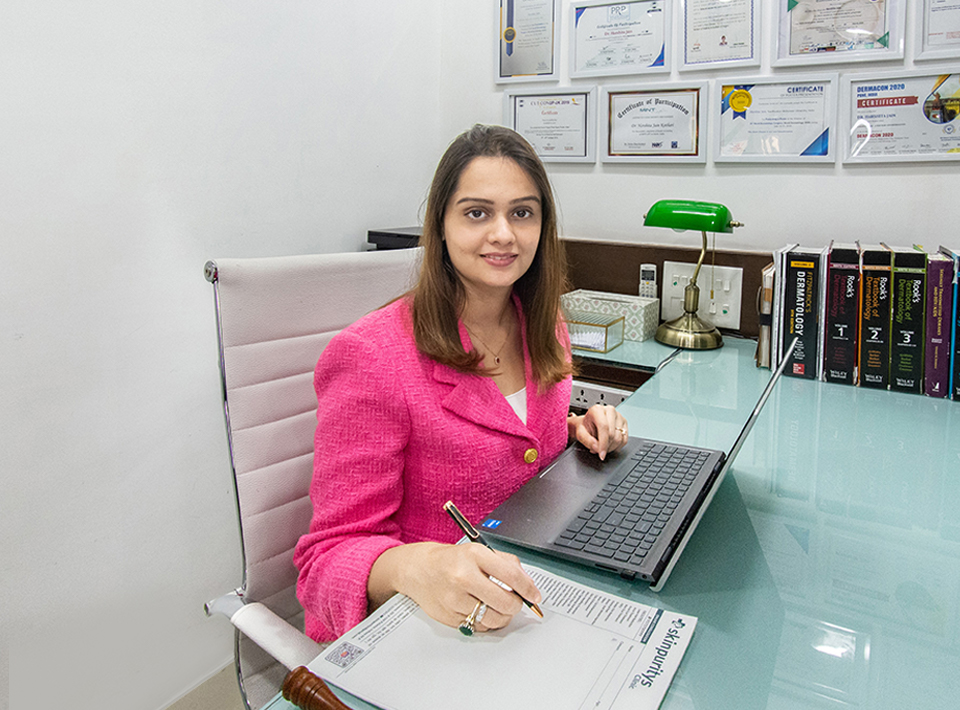
Are you the one who is struggling with acne due to hormonal imbalance? Hormonal acne,
commonly referred to as adult acne, is the acne breakouts that occur as a result of hormonal
imbalances among adults aged between 20 and 50 years.
It is directly caused by extra sebum production by the skin’s oil glands because of
excess and-rog-ens. As per dermatologist in Indore at SkinpuritysDermatology and Aesthetic
Clinic, thus it can appear on the face, back,
chest, or shoulders of both men and women (especially women) in different forms like
pimples, open or closed comedones, or cysts.
What is PCOS?
PCOS (Polycystic Ovarian Syndrome) is a gynaecological condition resulting from an endocrine
dysfunction- an increased production of and-rog-en (male se-x hormone) by ovaries. By name,
PCOS is described as the appearance of numerous
fluid-filled sacs called cysts in the ovaries, which may be on their outer edges. This is
the most common reproductive hormonal condition affecting women of childbearing age.
How is Hormonal acne connected to PCOS?
Women who are affected with PCOS often have increased levels of an-dro-gen in their body. A
rise in the level of this hormone level in PCOS-affected women causes unwanted effects and
leads to symptoms, including:
- Irregular menses
- Weight gain or difficulty in losing weight
- Hirsutism (extra hair growth on the face, chest, or back)
- Hormonal Acne
- Appearance of dark skin patches on the neck back or other areas (Acanthosis nigricans).
If you are experiencing the same and want to rule out the cause of your acne. Then an acne
treatment doctor in Indore at SkinpuritysDermatology and Aesthetic Clinic can help you.
What else causes acne?
Generally, acne is the result of the plugging of hair follicles or blocking of the skin pores
with extra sebum, dead skin cells, dirt, and sometimes bacteria. Excess hormonal activity is
one of the contributing factors for acne
breakouts. However, there are also triggers or risk factors for acne.
These include high stress, hormonal changes like during pregnancy, menopause, or because of
certain conditions like PCOS, and the use of certain medications like corticosteroids. Some
behaviours of the individuals can also result
in an increased probability of acne breakouts. These include not cleaning the face properly
and regularly, staying dehydrated, and using makeup or comedogenic skin products.
What are the treatment options for PCOS acne?
For mild acne breakouts, there are many over-the-counter acne medications available. These
medications usually contain salicylic acid, benzoyl peroxide, and sulfur that help treat
acne. But, none of them are enough to clear hormonal
acne. To clear PCOS acne, it is necessary to meet a dermatologist and get the underlying
hormonal imbalance fixed.
Dermatologist in Indore at
SkinpuritysDermatology and Aesthetic Clinic may prescribe one or more of the following
treatments to address PCOS acne:
- Oral contraceptives- Combination birth control pills can be taken to
stabilise the fluctuating hormones and treat hormonal acne. Usually, they have to be in
combination. However, these pills are contraindicated
in women aged above 35 years, smokers, and people who ever had or have blood clots,
breast cancer, or hypertension.
- Anti-an-dro-gen drugs- These are the prescription drugs that act to
reduce the levels of testos-tero-ne, the and-roge-ns- classified as male se-x hormones
in PCOS-affected women. By lowering extra an-dr-ogen
created in the body of PCOS-affected women, there is reduced sebum and skin cell
production and ultimately no hormonal acne breakouts. This treatment is recommended only
after the blood samples of the patients seeking acne
treatment are tested for levels of male hormone in their bodies.
- Ret-in-oids: In earlier times, over-the-counter reti-no-ids were used
to improve skin tone and texture and some of their formulations could even help with
acne.
For women who think they have PCOS-related
acne, seeing a dermatologist is necessary to get prescription-strength retin-oi-ds in
any form: oral or topical.
If prescribed for topical reti-no-id, make sure that it
is applied in the evening as it can leave the
skin extremely sensitive to the sun’s UV rays.
- Laser acne treatment in Indore: These are recommended by dermatologists
in case of severe hormonal acne breakouts They work to resurface the skin and unclog the
pores. The heat generated by lasers helps
shrink sebaceous glands and reduce sebum production as well as heat kill the
acne-causing bacteria, thereby reducing further acne breakouts. Furthermore, the lasers
help reduce post-inflammatory hyperpigmentation and facilitate
the skin’s natural healing by encouraging cell turnover, revealing a fresh,
clearer complexion. For more details on laser acne treatment get in touch with the best
doctor for acne and PCOS treatment in Indore at
SkinpuritysDermatology and Aesthetic Clinic.
- Medical grade chemical peel: Chemical peels are acid solutions that
when applied to the skin can help exfoliate the skin. By peeling off the skin epidermis,
the extra oil, dirt, dead skin cells, and bacteria
can all be removed from the clogged pores to reveal new, clear, healthier skin from
underneath. There are different strengths of acids (from mild to strong) that can be
used to treat hormonal acne.
- Rf microneedling: This minimally invasive technique is an advanced
version of microneedling. It involves the use of fine needles that are deeply inserted
into the affected skin to create microchannels. Through
these microchannels, heat generated from radiofrequency energy is delivered deep into
the skin directly targeting the overactive sebaceous glands, and stimulates fresh
collagen and elastin production. As a result, hormonal
acne is effectively treated. This acne treatment in Indore even works to mend damaged skin
tissues, lighten acne marks,
and fade atrophic acne scars.
What are the best ways to manage PCOS?
Follow these lifestyle changes to manage PCOS:
- Try to maintain a healthy weight. If you are overweight, losing weight can help lower
your in-su-lin and and-ro-gen levels, which can help restore ovulation and maintain
hormonal balance that can also prevent acne flare-ups.
- Eat a high-fibre diet and low-carbohydrate diet. Avoid consuming white bread, breakfast
cereals. Add more green vegetables, whole wheat grains, quinoa, fibre-rich fruits, and
cooked beans to your diet.
- Exercise regularly to help you track your calories and it also lowers hormone level,
such as te-stos-tero-ne.
- Keep yourself hydrated by drinking plenty of water.
- Say no to alcohol and low- or no-sugar beverages.
- Do not be a night owl. Lack of sleep can make acne and PCOS worse. Having sound sleep
can help manage PCOS.
- Anxiety and stress can make PCOS worse. Try to do meditation, exercise, walking, and
communication with your loved ones to keep your mood happy.
How can I self-deal with hormonal acne?
Whether you have undertaken any treatment for PCOS acne by a dermatologist or not, in either
case, you will need to maintain a proper skincare routine to stay acne-free for the long
term.
At a personal level, you can avoid or manage hormonal acne in the following ways:
- Wash your face twice a day daily with a gentle cleanser and gently exfoliate your skin
once a week.
- After cleansing your skin, always apply a grease-free moisturiser that best suits your
skin type.
- Avoid rubbing, scratching, and picking acne breakouts.
- Apply only non-comedogenic skin products and make-up.
PCOS if left undiagnosed can also cause certain other health issues. It is
better to consult a dermatologist who can rule out the cause of your acne and treat it
effectively.
Visit SkinpuritysDermatology and Aesthetic Clinic for more details on PCOS hormonal acne
treatment and ways to achieve a healthy body and skin.
Content Reviewed and Updated by Dr. Harshita Kothari





